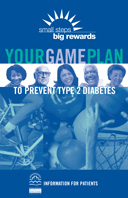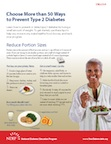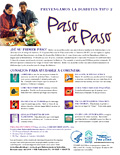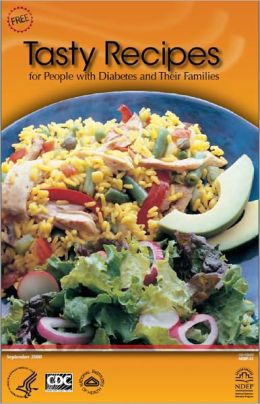3A - NDEP DHS Participant Pretest_110613_OMB30
3A - NDEP DHS Participant Pretest_110613_OMB30.docx
COMMUNITY EVALUATION OF THE NATIONAL DIABETES EDUCATION PROGRAMS DIABETES HEALTHSENSE WEBSITE
3A - NDEP DHS Participant Pretest_110613_OMB30
OMB: 0925-0694
Diabetes HealthSense
Participant Pre Survey
The National Diabetes Education Program is trying to find out how well the Diabetes HealthSense website can help people at risk for diabetes and people with diabetes. You will help improve Diabetes HealthSense by taking this survey. This survey will take you about 20 minutes to complete. The survey includes questions about you and your health. Unless the directions say otherwise, please choose one response for each question. Your survey answers are private.
Public reporting burden for this collection of information is estimated to average 20 minutes per response, including the time for reviewing instructions, searching existing data sources, gathering and maintaining the data needed, and completing and reviewing the collection of information. An agency may not conduct or sponsor, and a person is not required to respond to, a collection of information unless it displays a currently valid OMB control number. Send comments regarding this burden estimate or any other aspect of this collection of information, including suggestions for reducing this burden, to: NIH, Project Clearance Branch, 6705 Rockledge Drive, MSC 7974, Bethesda, MD 20892-7974, ATTN: PRA (0925-xxxx*). Do not return the completed form to this address.
ID Code
To keep your responses private an ID code will be created using the following information.
Please write down YOUR first and last initials: [Example: Jane Smith is J.S; Jane Doe-Smith is J.D.] |
First Initial Last Initial |
What is your MONTH and YEAR of BIRTH? [Ex: Write 05/95 if your birthday is May 22, 1995] |
/ MM YR |
Please choose your program location:
Site 1 Site 2 Site 3 Site 4 Site 5 |
Site 6 Site 7 Site 8 Site 9 Site 10 |
Site 12 Site 12 Site 13 Site 14 Site 15 |
Resources
How often do you look for information on preventing or managing diabetes?
Never Rarely Sometimes Often
Where have you received or found information about diabetes prevention and management? (Choose one or more)
Health care provider
Mass media (such as TV, radio, newspaper)
Social media (such as Facebook)
Internet
Friends/family
Diabetes education class or program
Professional associations
None of the above
In the last month, have you participated in a diabetes education class or program? (For example, attended one or more individual or group classes or meetings with a diabetes educator, nurse or dietitian?)
No
Yes
3a. If Yes, please specify: ________________________
|
Never heard of it |
Heard of it but do not have it |
Have it but have not used it |
Have it and used it once |
Have it and use it a lot |
|
|
|
|
|
|
|
|
|
|
|
|
|
|
|
|
|
|
|
|
|
|
|
|
|
|
|
|
|
|
|
|
|
|
|
|
|
Never |
Once this month |
2-3 times this month |
Once a week |
More than once a week |
|
|
|
|
|
|
|
|
|
|
|
|
Risk
Has a doctor or other health professional ever told you that you: (Choose one or more)
Have Type 1 diabetes
Have Type 2 diabetes
Have prediabetes or borderline diabetes
Have high blood glucose (blood sugar), impaired fasting glucose, or impaired glucose tolerance?
Are at risk for diabetes
Which, if any, of the following is true for you? (Choose one or more)
I have a mother, father, sister, or brother with diabetes
I have been told by a doctor or other health professional that I have high blood pressure
I have been told by a doctor or other health professional that I have high cholesterol
I am NOT physically active
I was diagnosed with gestational diabetes during any of my pregnancies
I have given birth to a baby weighing 9 pounds or more
I smoke
Knowledge and Behaviors
Which of the following can quickly raise your blood glucose (blood sugar)?
Baked chicken
Swiss cheese
Baked potato
Peanut butter
Eating foods lower in saturated and trans fat decreases your risk for:
Nerve disease
Kidney disease
Heart disease
Eye disease
The A1C is a measure of your average blood glucose (blood sugar) for the past:
Day
Week
2-3 months
6 months
Which should not be used to treat low blood glucose (blood sugar)?
3 hard candies
1/2 cup orange juice
1 cup diet soft drink
1 cup skim milk
Which of the following is the least amount of physical activity you should do to prevent or manage diabetes?
30 minutes of activity, five times a week (or 150 minutes per week)
10 minutes of activity, seven days a week (or 70 minutes per week)
45 minutes of activity, six days a week (or 270 minutes per week)
Which of the following exercise programs includes a mix of strength, flexibility and aerobic activities?
Walking, running, and swimming
Lifting weights, push-ups, sit-ups
Walking, lifting weights, stretching
Stretching, deep breathing, meditating
The best way to lose weight is to:
Limit amount of physical activity
Increase portion sizes
Combine healthy eating and exercise
Reduce dietary fat without reducing calories
Which of the following factors contribute to a person’s weight? (Choose one or more)
Family history and genetics
Environment
Metabolism
Behavior or habits
The best way to take care of your feet is to:
Check them each day for cuts, blisters and swelling
Massage them with alcohol each day
Soak them for one hour each day
Buy shoes a size larger than usual
People with diabetes whose blood glucose (blood sugar) is out of control are at greater risk of which complications? (Choose one or more)
Serious eye problems
Circulation problems
Kidney Problems
Allergy problems
Gum disease
Heart attack or stroke
Which of the following may be a sign of an emotional low and/or depression in a person with diabetes?
(Choose one or more)
Sleeps most of the day
Does not have an interest or find pleasure in activities
Does not feel in control of their diabetes
Discusses diabetes care with family and friends
Depression can raise your blood glucose (blood sugar) by causing you to eat too much, do too little, and reduce your motivation to take care of yourself.
True
False
Which of the following steps are important ways to help you achieve your goals?
(Choose one or more.)
Making a plan with realistic goals
Tracking progress
Avoiding rewards
Using a support system
For each statement, please check the option that best describes your behaviors.
|
No, and I do not plan to |
No, but I plan to within the next 6 months |
No, but I plan to within the next month |
Yes, I started this less than 6 months ago |
Yes, I have been doing this for 6 months or longer |
|
|
|
|
|
|
|
|
|
|
|
|
|
|
|
|
|
|
|
|
|
|
|
|
|
|
|
|
|
|
|
|
|
|
|
|
|
|
|
|
|
|
|
|
|
|
|
|
|
|
|
|
|
|
Are you seriously thinking of quitting smoking?
I have never smoked or I quit more than 6 months ago
I am not thinking of quitting
I plan to quit within the next 6 months
I plan to quit within the next 30 days
I quit within the last 6 months
Please indicate the degree to which each of the following items may be bothering you. If you feel that a particular item is not a bother or a problem for you, you would check “1.” If it is very bothersome to you, you might check “6.”
|
Not a problem |
Moderate Problem |
Serious Problem |
|||
1 |
2 |
3 |
4 |
5 |
6 |
|
|
☐ |
☐ |
☐ |
☐ |
☐ |
☐ |
|
☐ |
☐ |
☐ |
☐ |
☐ |
☐ |
|
Not At All Confident |
Totally Confident |
||||
1 |
2 |
3 |
4 |
5 |
6 |
|
|
|
|
|
|
|
|
|
|
|
|
|
|
|
|
|
|
|
|
|
|
|
|
|
|
|
|
|
|
|
|
|
|
|
|
|
|
|
|
|
|
|
|
|
|
|
|
|
|
|
|
|
|
|
|
|
|
|
|
|
|
|
|
|
Not At All Confident |
|
Totally Confident |
Does Not Apply |
|||
1 |
2 |
3 |
4 |
5 |
6 |
||
|
|
|
|
|
|
|
|
|
|
|
|
|
|
|
|
|
|
|
|
|
|
|
|
|
|
|
|
|
|
|
|
|
Never |
Rarely |
Sometimes |
Often |
All of the time |
|
|
|
|
|
|
|
|
|
|
|
|
|
|
|
|
|
|
|
|
|
|
|
|
|
|
|
|
|
|
|
|
|
|
|
|
|
|
|
|
|
|
|
|
|
|
|
|
|
Never |
Rarely |
Sometimes |
Often |
All of the time |
|
|
|
|
|
|
|
|
|
|
|
|
|
|
|
|
|
|
|
|
|
|
|
|
|
|
|
|
|
|
|
Never |
Rarely |
Sometimes |
Often |
|
|
|
|
|
|
|
|
|
|
|
|
|
|
|
|
|
|
|
|
|
|
|
|
|
|
|
|
|
|
|
Never |
Rarely |
Sometimes |
Often |
All of the time |
Does not apply |
|
|
|
|
|
|
|
|
|
|
|
|
|
|
|
|
|
|
|
|
|
|
|
|
|
|
|
|
About You
What is your gender?
Female
Male
How old are you?
Under 25
25-34
35-44
45-54
55-64
65+
What is your height? _________ feet and inches
What is your weight? ________ lbs
Are you Hispanic or Latino?
No
Yes
What is your race? (Choose one or more)
Black or African American
White
American Indian or Alaska Native
Native Hawaiian or other Pacific Islander
Asian
Is English your primary language?
No
Yes
What is the highest level of education you have completed?
Some high school (grades 9-11)
High school degree or GED
Associate degree (2-year)
College degree (4-year)
Graduate degree
Please check the category that represents your annual household income.
Less than $15,000
$15,000-$35,000
$36,000-$50,000
$51,000-$75,000
Over $75,000
How often do you use the internet at home?
Rarely or Never 2-3 times a month Once a week 2-3 times a week Daily
How often do you need to have someone help you understand written instructions, pamphlets, or other materials from your doctor or pharmacy?
Never Rarely Sometimes Often Always
| File Type | application/vnd.openxmlformats-officedocument.wordprocessingml.document |
| Author | Carrie Carpenter |
| File Modified | 0000-00-00 |
| File Created | 2021-01-28 |
© 2026 OMB.report | Privacy Policy






